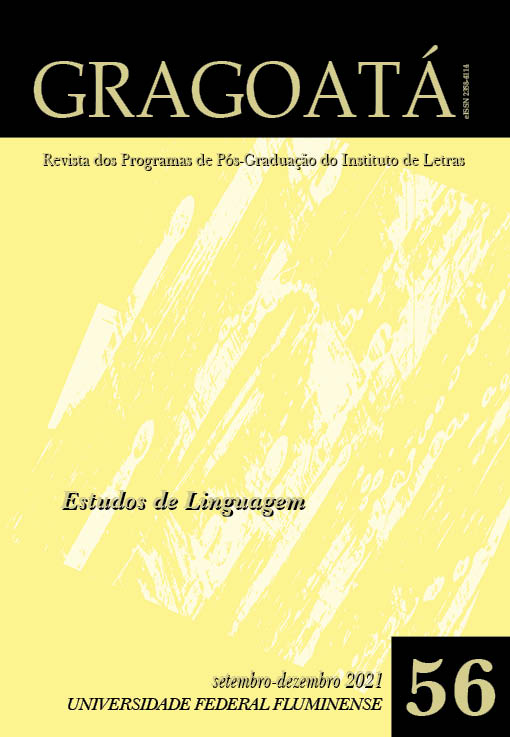Representações: marcas abissais da in-exclusão em material didático sobre povos indígenas
DOI:
https://doi.org/10.22409/gragoata.v26i56.49056Palavras-chave:
Discurso Didático. Representação. Sujeito indígena. In-exclusãoResumo
Este artigo objetiva problematizar a representação do sujeito indígena e do sujeito branco no livro didático Povos indígenas no Brasil mirim (RICARDO; KLEIN, 2015), publicado pelo Instituto Socioambiental – ISA, em 2015, como suporte didático no cumprimento da obrigatoriedade do ensino das Histórias e das Culturas Indígenas na educação básica brasileira, a partir da Lei nº 11.645/2008 (BRASIL, 2008). Partimos da hipótese de que o entrecruzamento discursivo nascido das vozes jurídico-administrativas e educacionais, materializados nos livros didáticos sobre os indígenas, suas histórias e culturas como formas de saber possibilitam a (re)construção e/ou a (re)significação do processo de colonização e de desejo de controle, por parte daqueles que têm o poder de estatizar uma possível representação da subjetividade em relação aos povos indígenas e seus patrimônios culturais. Para tanto, pautamo-nos teórico-metodologicamente, transdisciplinarmente, na Análise do Discurso de origem francesa (PÊCHEUX, 1988), na perspectiva discursivo-desconstrutiva (CORACINI, 2007, 2016; GUERRA, 2010); na Arqueogenealogia Foucaultiana (2014, 1997); na visada decolonial (CASTRO-GÓMES, 2005; MIGNOLO, 2003, 2008; SANTOS 2007; PALERMO, 2019; QUIJANO, 2005; ORTIZ, 1983) e nas considerações de Munduruku (2017) para ponderar o delineamento desses processos de subjetivação/objetivação postos em circulação a partir dos sujeitos e das culturas indígenas, em face da sociedade hegemônica. Resultados obtidos apontam a emergência de efeitos de sentido de uma urdidura discursiva docilizadora de corpos, arregimentadora de condutas em formação que se encontra amparada no ideário capitalista transformador da cultura em um “bem de consumo” e utilizador desta para cumprir pautas político-diplomáticas entre o Estado-Nação brasileira e os demais países membros da ONU (Organização das Nações Unidas).
Downloads
Downloads
Publicado
Edição
Seção
Licença
AUTORIZAÇÃO
Autores que publicam em Gragoatá concordam com os seguintes termos:
Os autores mantêm os direitos e cedem à revista o direito à primeira publicação, simultaneamente submetido a uma licença Creative Commons Atribuição 4.0 Internacional (CC BY 4.0), que permite o compartilhamento por terceiros com a devida menção ao autor e à primeira publicação pela Gragoatá.
Os autores podem entrar em acordos contratuais adicionais e separados para a distribuição não exclusiva da versão publicada da obra (por exemplo, postá-la em um repositório institucional ou publicá-la em um livro), com o reconhecimento de sua publicação inicial na Gragoatá.
A Gragoatá utiliza uma Licença Creative Commons - Atribuição CC BY 4.0 Internacional.











